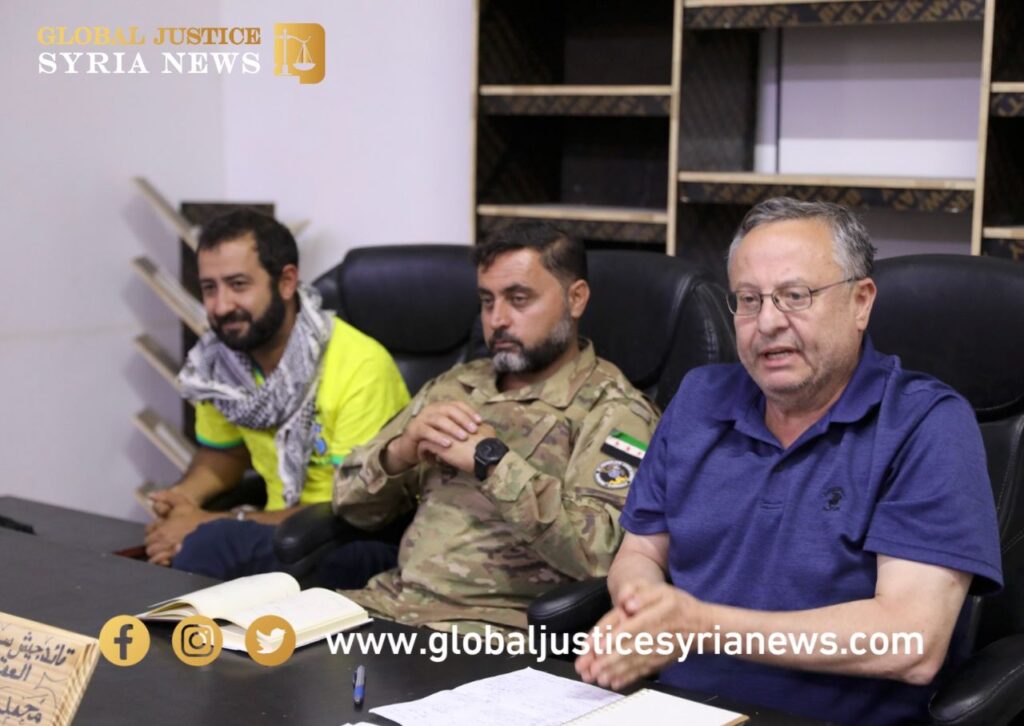Global Justice Syria News – Exclusive – Al-Rukban Camp:
Dr. Haytham Albizem, head of Global Justice, said that the organization, in cooperation with the Syrian Emergency Tas Force (SETF), launched relief and development projects in the besieged Rukban camp, during his visit to the camp during the past few days.
This came in a special press interview with the “Global Justice Syria News” website, which included Dr. Albizem, Colonel Farid Al-Qasim, Commander of the Free Syrian Army, and the Executive Director of the Syrian Emergency Team Organization, Moaz Mustafa, in the presence of cadres from the Global Justice Organization via the Internet.
These projects, which were approved and began to be implemented directly, came after a field tour conducted by Dr. Albizem and Mustafa, which included all economic, medical and educational sectors in the camp.
As for the first project that Global Justice and the Syrian Emergency Team will work to implement, it is supporting livestock and feeding children, as Dr. Albizem confirmed that his organization decided to purchase 10 cows from outside the Rukban area, plant areas with the necessary fodder plants to secure resources for them, and dig a private water well.
Albizem explained that the milk production of these cows will be distributed on a daily basis to school children in the camp in cooperation with the Free Syrian Army, which will contribute to securing the barns and some necessary logistics.
Education support
The second project will be building two schools in the camp.During Dr. Albizem tour in the camp, he came across. As he explained, there was a tent across the desert area with about 20 children inside it. When he asked him why they were gathering, his companions told him that it was an elementary school.
The sight of children gathered in a very hot atmosphere to receive knowledge impressed Dr. Albizem, and he decided accordingly to establish two schools in the camp, one of which would be an alternative to a tent and the second an alternative to a living room in a house where children would gather to study.
Global Justice will provide all the supplies for the two schools, starting from the construction stage and ending with the necessary equipment for the educational process, including chairs, boards, books, stationery, and others.
The third project will contribute to a plan to secure monthly salaries for teachers. Albizem and Mustafa’s tour revealed the presence of 7 schools in the Rukban camp, staffed by 70 male and female teachers, who provide their services entirely on a voluntary basis.
After holding a meeting with the teaching staff and the women’s office in the Rukban camp under the auspices of the Free Syrian Army, Albizem pledged to provide them with a fixed monthly salary, starting next month.
A visit that restored hope to the residents of Rukban
For his part, Colonel Farid Al-Qasim, Commander of the Free Syrian Army, said that this visit seemed to be a great opportunity for the people of Rukban and the region in general, and it infused them with positive energy and gave them hope. He expressed his full readiness to provide everything necessary for the success of the projects that had been agreed upon and those in the plan.
As for the Executive Director of the SETF organization, Moaz Mustafa, he pointed to the great steps that were made after breaking the siege on the Rukban camp, stressing that the partnership between his organization and “Global Justice” provided the camp with a lot, such as thousands of school books, and now through medical services, and he thanked For the US Army, which provided humanitarian service to civilians in need of assistance, including the emergency aspect, and only in specific cases.
Mustafa also stressed encouraging everyone in the United States and the world to help the people of the Rukban camp, considering that this visit was one of the most important stations in his life after he saw the joy on the faces of the children and women who had long suffered from neglect by humanitarian organizations and supporting agencies in this “forgotten” camp.
Cross-border medical clinics
Regarding the fourth project, Dr. Albizem said that what most worries residents in Al-Rukban camp is the lack of doctors. During his visit to the medical point, he saw a child suffering from severe dehydration and nervous seizures, while the health staff was finding it extremely difficult to deal with this condition, and the infant’s life was in danger.
Because Albizem specializes in internal medicine and cardiology, he decided to resort to specialized expertise in pediatrics, and to contact a pediatrician in the United States to seek his help in treating the condition, which is what actually happened, as the child improved after that.
Hence the idea came to establish online medical clinics, including doctors from all specialties who provide advice to the medical staff in the Rukban camp, who in turn treat patients based on the instructions provided.
On the other hand, the residents of Al-Rukban camp suffer from a severe shortage of medicines, as there is only the “Al-Amal” pharmacy, funded by the Syrian Emergency Team Organization, in the region, which has been distributing medicines free of charge to patients over the past years.
Accordingly, Albizem and Mustafa agreed to open a second pharmacy, with Global Justice and the Syrian Emergency Organization sharing the costs of both pharmacies.
Support agriculture
Albizem was briefed on the agricultural project set up by SETF in Al-Rukban camp, and based on this successful experience, it was agreed that Global Justice would expand the project and cultivate more land with vegetables and secure the necessary seeds and irrigation pipes, in the hope of achieving self-sufficiency.
Albizem seemed enthusiastic about serving the Rukban camp, and pledged to make every effort to encourage organizations and actors and to improve all his relationships for the sake of thousands of Syrians living in miserable conditions.

